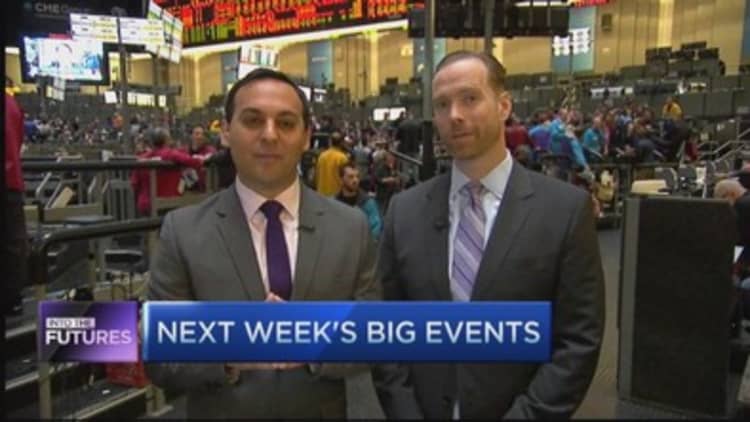
If you're looking for value in U.S. stocks, you'd better look hard.
The S&P 500 Index's forward price-to-earnings ratio—the popular metric that measures how much investors are willing to pay for each dollar of expected future earnings—closed the week at 17.1, according to FactSet data. That's more than one-third higher than the P/E of three years ago.
Even with Friday's 1.1 percent drop, then, equities are not exactly at bargain level prices. (Tweet this)
Read More Dow recovers from 350-point plunge but ends week down 1.3 percent
"We're a value-driven shop, so everything we do is driven by the ability to acquire assets, stocks in particular, at a discount to intrinsic value," said Scott Clemons, chief investment strategist at Brown Brothers Harriman. "But there are precious few opportunities like that on the ground."
Dramatically inflated, and frustrating
The corporate results set to be released in the weeks ahead, which are expected to show the first year-over-year earnings drop for the S&P 500 since the third quarter of 2012, may put the exclamation point on the market's high valuations. Still, it's not just earnings.
Other measures of market valuation, such as price-to-sales and price-to-book ratios, also show dramatically inflated readings.Yet that's not necessarily an argument for ditching one's stock holdings.
First of all, stocks must be evaluated in a broader context, so that investors should base their fair-price estimates based on the broader economic landscape, or at least on the returns that can be found in the bond market. Second, valuation growth or shrinkage is often a slow story that plays out over a long time period—so neither fat nor stretched valuations are particularly helpful in predicting the market's next move.
Read MoreEarnings gusher is next test for stocks after market wipeout
Yet for those committed to follow a value-investing strategy, whereby one buys cheap names in the hopes that they will rise in price as more investors realize their true value, this is a frustrating market environment indeed.
Due to the dearth of attractive opportunities, Brown Brothers' Clemons has decreased equity holdings and is "sitting on a fair amount of cash, and short-term, high-quality fixed income investments. And we're viewing that as ammunition that we can use to take advantage of opportunity."
At the same time, Clemons acknowledges that he could have—and did—lodge his same complaint about valuations one, two and three years ago. In the meantime, stocks have soared.
"A year from now, could we have a market trading at 22 times earnings with negative earnings growth? Sure," he said. "The market's riskier now, but the problem with risk is just because it's risky, doesn't mean something's going to go wrong."
Clemons says he would expect opportunities to arise if stocks fell by 10 percent or more. But in the meantime, Clemons says that the risk of nothing going wrong is simply a risk that he'll have to deal with.
"The curse of value investing—which I think is a great way to build and preserve wealth over time—is that value is a really poor timing tool. As a value investor you kind of acknowledge that it takes a great deal of patience and discipline," he said.
"We have to be careful that we're not buying broken companies."Charlie DyReyesBrandywine Global
Others are still finding places to buy, even if today's cheap stock is very different than the cheap stock of five years ago.
"Undoubtedly, it's much harder to find good value today," said Charlie DyReyes, senior research analyst for large cap equity strategies at Brandywine Global.
DyReyes says that his team constantly runs programs to screen to hunt for attractively valued stocks, and these screens are now producing "a much shorter list than we saw three or four years ago. And the companies that are on this list definitely have a lot more hair on them."
While the stocks that used to be cheap "were cheap for no reason, now we have to wonder why they're cheap," he added. "We have to be careful that we're not buying broken companies."
Still, DyReyes says that he still spots "pockets of value," including in large-cap banks such as JPMorgan and Wells Fargo, private equity companies such as BlackStone and KKR, and energy stocks like Continental Resources.
"We're finding value in select energy companies, which we bought starting in December and through to today," he said. As oil prices plunged, "the baby is getting thrown out with the bathwater. We see this as a once-in-a-multiyear-period to buy energy companies much cheaper."
Similarly, David O'Malley of Penn Mutual Asset Management says that energy and metals and mining stocks are two of the rare sectors in which bargains can still be found.
"The deep value is in places where there's so much bad news priced in that even if there is bad news, they won't fall further," O'Malley said. "If you look at stocks like BHP Billiton and Rio Tinto, these are global enterprises and great companies, and they're trading at great values and paying attractive dividends."
On the whole, however, the value-conscious O'Malley predicts that "this is going to be a difficult year for stocks."
—By CNBC's Alex Rosenberg.
Watch "Futures Now" Tuesdays & Thursdays 1 p.m. ET exclusively on FuturesNow.CNBC.com!



